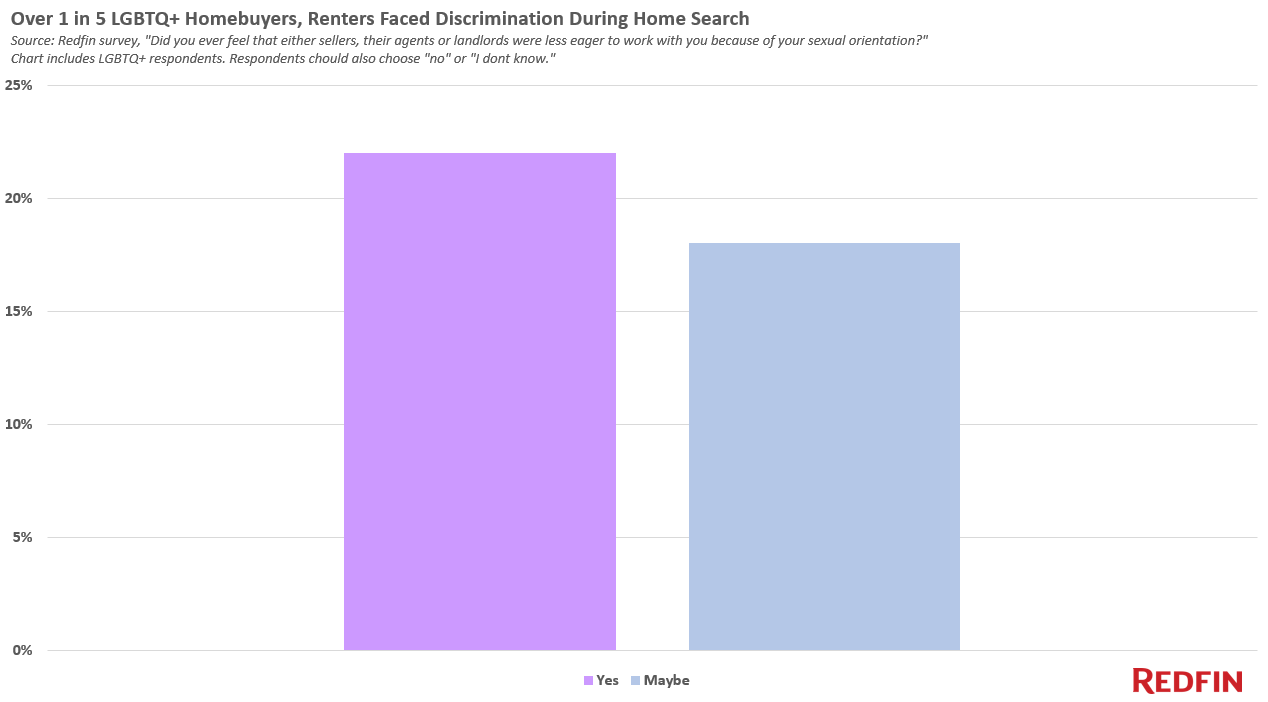One in five LGBTQ+ respondents felt they were discriminated against because of their sexual orientation.
Nearly one-third (32%) of Black Americans who recently moved believe they were discriminated against based on their ethnicity or race during their home search, and an additional 22% believe they may have been discriminated against. The share is even higher for Hispanic Americans: 36% experienced discrimination, and an additional 22% believe they may have been discriminated against.
That’s according to a Redfin-commissioned survey conducted by Qualtrics in spring and summer 2023. The survey was fielded to more than 5,000 U.S. residents who either moved in the last year or plan to move in the next year, or who rent their home. The survey questions relevant to this report are as follows: 1) “During your most recent home search process, did you ever feel that sellers, their agents or landlords were less eager to work with you because of your ethnicity or race?” 2) “During your most recent home search process, did you ever feel that sellers, their agents or landlords were less eager to work with you because of your sexual orientation?” There are more details on survey methodology at the end of the report.
Asian respondents who recently moved were less likely than Black or Hispanic respondents to report discrimination; 20% of them believe they were discriminated against based on their ethnicity or race. An additional 27% believe they may have faced discrimination. Twelve percent of white respondents report they faced discrimination, and 9% say they may have.
A large portion of non-white homebuyers and renters feel housing discrimination despite laws against it. The federal Fair Housing Act is intended to protect homebuyers and renters from discrimination based on race, color, national origin, religion, sex, familial status and disability. It’s illegal to refuse to rent or sell a home, refuse to enter negotiations, or impose higher prices to a person based on one of those characteristics, among many other guidelines.
Still, discrimination isn’t uncommon in the housing and rental market, and isn’t always overt. One example of discrimination in the housing market is “steering,” which is when a broker guides a buyer or seller away from the neighborhood their client is interested in and toward a neighborhood where their client “might fit in better.” Another example of discrimination is when sellers, agents or landlords decide not to sell or rent to a person due to their race or ethnicity. Often, it isn’t explicit. A landlord might agree to rent to a person of color over the phone, but deny them for a bogus reason like a negative reference after meeting the prospective renter in person.
About 1 in 5 LGBTQ+ homebuyers, renters faced discrimination during home search
More than one in five (22%) LGBTQ+ people who recently moved believe they were discriminated against based on their sexual orientation during their most recent home search. An additional 19% believe they may have been discriminated against.

The U.S. Supreme Court ruled in 2020 that under the Fair Housing Act, “sex” includes gender identity and sexual orientation. Discrimination based on gender identity or sexual orientation, like discrimination based on ethnicity or race, is often not blatant. Examples include a real estate agent refusing to show a home to a potential buyer because the buyer is transgender or a landlord opting not to rent to a same-sex couple–but not necessarily explicitly stating those are the reasons.
Discrimination drove roughly 1 in 10 Black, Hispanic and LGBTQ+ respondents away from previous residence
Roughly 1 in 10 (8%) Black respondents who moved in the last year did so because they faced discrimination in their previous neighborhood, and an additional 8% moved because they faced discrimination from their previous landlord. The findings are similar for Hispanic and Asian respondents: 11% of Hispanic people cited facing discrimination in their previous neighborhood as a reason for their move, and 8% cited discrimination from their previous landlord. Seven percent of Asian respondents moved because they faced discrimination in their previous neighborhood, and an additional 7% moved because they faced discrimination from their previous landlord.
Like Black and Hispanic house hunters, roughly 1 in 10 (9%) of LGBTQ+ survey respondents who moved in the last year did so because they faced discrimination in their previous neighborhood. An additional 8% moved because of discrimination from their previous landlord.
Methodology
This report is based on a Redfin-commissioned survey conducted by Qualtrics in spring and summer 2023. The survey was fielded to more than 5,000 U.S. residents who either moved in the last year, plan to move in the next year, or rent their home. This report focuses on the 1,990 respondents who recently moved. Of those respondents, 440 were Black, 152 were Hispanic, 118 were Asian and 1,358 were white. Just over 400 of those respondents were LGTBQ+.
The survey questions relevant to this report are as follows: 1) “During your most recent home search process, did you ever feel that sellers, their agents or landlords were less eager to work with you because of your ethnicity or race?” 2) “During your most recent home search process, did you ever feel that sellers, their agents or landlords were less eager to work with you because of your sexual orientation?” Respondents could choose between the following answer choices: “Yes,” “Maybe,” “No” or “I don’t know.”





